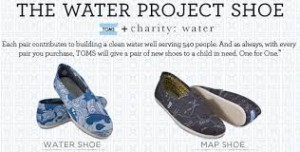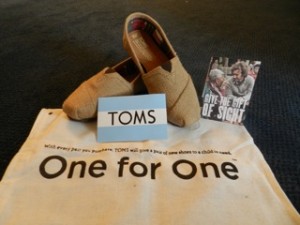 Toms Shoes is a company that is famous for pioneering social entrepreneurship. Their implementation of the one-for-one business model is hugely successful from a marketing perspective. Socially conscious consumers feel like they are making a difference when they buy a pair of Toms Shoes as for each pair sold, the company gives away a pair to someone in need.
Toms Shoes is a company that is famous for pioneering social entrepreneurship. Their implementation of the one-for-one business model is hugely successful from a marketing perspective. Socially conscious consumers feel like they are making a difference when they buy a pair of Toms Shoes as for each pair sold, the company gives away a pair to someone in need. 
However, Toms and other one-for-one businesses have faced criticism for this strategy. Critics say that these donations are merely a band aid and ineffective in addressing the complex social issues causing poverty and may actually be an obstacle to sustainable long term solutions. When a foreign company intervenes with free products, it can have the unintentional effects of undermining local businesses, creating dependency and demoralizing the recipients of the charity and promote complacency among consumers about taking other initiatives to address these social problems.
 In response to these criticisms, Toms has modified their model significantly to avoid these negative effects. It’s begun manufacturing locally in the countries where the shoes are given away, sustaining local jobs and empowering people to lift themselves out of poverty. I believe that Toms began with good intentions and was merely misguided in their attempts to alleviate poverty. They recognize their flaws and imperfections are doing their best to improve their business model.
In response to these criticisms, Toms has modified their model significantly to avoid these negative effects. It’s begun manufacturing locally in the countries where the shoes are given away, sustaining local jobs and empowering people to lift themselves out of poverty. I believe that Toms began with good intentions and was merely misguided in their attempts to alleviate poverty. They recognize their flaws and imperfections are doing their best to improve their business model.

References:
Davenport, Cheryl. “The Broken “Buy-One, Give-One” Model: 3 Ways To Save Toms Shoes.” Co.Exist. 10 Apr. 2012. Web. 16 Nov. 2015.
“The One-for-one Business Model: Avoiding Unintended Consequences.” KnowledgeWharton The Oneforone Business Model Avoiding Unintended Consequences Comments. Web. 15 Nov. 2015.
Poulos, James. “Toms Shoes: A Doomed Vanity Project?” Forbes. Forbes Magazine. Web. 17 Nov. 2015.
